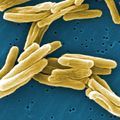Text to go here...
 Mice infected with a genetically modified relative of the tuberculosis bacterium became immune to tuberculosis, a new study has shown. The finding represents a novel way of making vaccines and sheds new light on how the disease evades the immune system.
Mice infected with a genetically modified relative of the tuberculosis bacterium became immune to tuberculosis, a new study has shown. The finding represents a novel way of making vaccines and sheds new light on how the disease evades the immune system.
Tuberculosis (TB) is a lung disease caused by the bacterium Mycobacterium tuberculosis. It is one of the top ten leading causes of death, killing 1.7 million people each year, mostly in the developing world. The current vaccine is not very effective and has varying rates of success across the globe.
Researchers were interested in a set of genes called esx-3, which are found in all members of the Mycobacterium family. These genes help the bacteria to evade the host's immune system.
In the study, scientists deleted the esx-3 genes from a relative of the M tuberculosis bacterium called Mycobacterium smegmatis. They then infected mice with a deadly dose of the modified bacterium. Because the bacteria lacked the esx-3 genes, the mouse's immune system fought off the infection. The researchers then put the esx-3 genes from M tuberculosis into the modified bacterium. Again, the mice were able to survive a deadly dose of this bacterium.
To the researcher's surprise the mice were also immune to M tuberculosis. The modified bacterium acted like a vaccine, preparing the immune system for a future infection. When infected with M tuberculosis, mice also given the modified bacterium lived on average twice as long as mice treated with the normal TB vaccine. One in five mice were completely free of both bacteria after 200 days.
Read more about TB on our sister website.
Last edited: 11 January 2022 14:52




